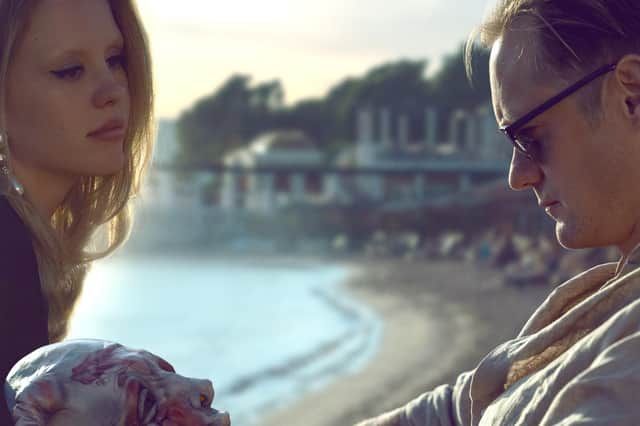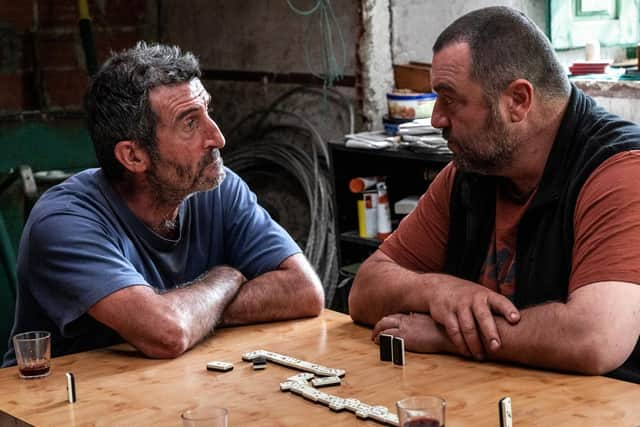Film reviews: Infinity Pool | The Beasts | A Good Person | Breaking


Infinity Pool (18) ****
The Beasts (15) ****
A Good Person (15) **
Breaking (15) ***
Wealth can grant you access to everything except a soul in Brandon Cronenberg’s new film Infinity Pool, a body horror sci-fi hybrid about a novelist (Alexander Skarsgård) introduced to the amoral pleasures of consequence-free violence while holidaying in a luxury resort for the super rich. After Triangle of Sadness, Glass Onion, The Forgiven, The Resort and, on TV, The White Lotus and Succession, any story about one-percenters treating far flung parts of the world as their own personal playgrounds risks feeling like a cliché at this point. But credit where it’s due: Cronenberg has found a provocative way to explore the sometimes barbarous nature of this easy-to-hate social class.
The film begins with Skarsgård’s James and his rich wife Em (Cleopatra Coleman) grappling with their own marital malaise the way rich people in movies often do: by not acknowledging there’s a problem in the first place. Instead they’re holidaying in a gated upscale resort on a fictional island, wallowing in the tedium of deciding where to eat each evening while James kids himself on that this break will provide the inspiration he needs to finally follow-up the (unsuccessful) novel he wrote six years earlier.
Advertisement
Hide AdInstead he’s soon distracted by a gilded European couple who flatter him into joining them as they defy the resort’s rules and explore the island on their own – a dangerous proposition, we’re told, especially with the resort’s heavily fortified boundaries occasionally breached by locals protesting the inequality brought about by the tourist trade. That the woman in the couple is played by Mia Goth – continuing her run of psychologically complex horror movie protagonists begun with X and continued with last week’s Pearl – should be enough to tip viewers off that bad things are in store for James; if not, her character’s sexually explicit exhortations should do the trick.


All of which can make it seem as if Cronenberg, at least in these early parts of the film, is a little too fond of recycling the tropes of every wealthy-westerner-in-trouble thriller going (the film’s key incident even involves a car accident and the death of a local). Yet they’re also soon revealed to be dramatic red-herrings, a way of leading us into an even more deranged story in which the rich can buy their way out of trouble by paying to have a substitute answer for their crimes. Quite what form the latter takes shouldn’t be spoiled in a review; suffice to say that if you’ve seen Cronenberg’s previous film, the excellent Possessor (or, indeed, any of his father David's even more twisted oeuvre), what follows is an inventively gory, disorientating, trippy and thematically astute exploration of elite privilege taken to sickening extremes, with Skarsgård playing brilliantly against type as an emasculated interloper gradually waking up to the fact that the super-wealthy might be a subspecies all their own.
There’s more class tension in The Beasts, a nerve-wracking Spanish thriller about a middle-aged French couple (Denis Ménochet and Marina Foïs) whose well-intentioned dream of reviving a struggling Spanish mountain community by creating an organic farm inflames the locals who want to cash in on a proposed wind farm development. As such, the first half plays like a warped cross between Local Hero and a Michael Haneke film as director Rodrigo Sorogoyen (working from a script co-written with Isabel Peña) zeroes in on a series of escalating micro-aggressions perpetrated against Ménochet’s Antoine by a pair of brothers (Luis Zahera and Diego Anido) struggling to make ends meet on the neighbouring dairy farm. But while there are shades here too of Straw Dogs in the brothers’ brazen xenophobia, as Foïs’ character Olga moves centre stage in its second half, it becomes a much more surprising interrogation of the destructive nature of the male ego.
After this year’s astonishing Nan Goldin documentary All the Beauty and the Bloodshed, it’s a little hard to take Florence Pugh’s performance as an OxyContin addict in A Good Person all that seriously. Written and directed by Zach Braff, the film uses America’s opioid crisis as a backdrop for a neatly packaged redemption saga that’s far too schematic and polished to really reveal much about anything. Pugh plays Allison, a pharmaceutical rep who gets hooked on her own product after crashing her car, an accident that also kills her fiancé’s sister and her husband. Cut to a year later and, with her prescription pill addiction out of hand and her life in free-fall, she decides to attend her first Narcotics and Alcoholics Anonymous meeting, only to discover it’s the same one used by her former fiancé’s estranged father, an alcoholic ex-cop, played by Morgan Freeman, who blames her for the accident. The ensuing melodrama – replete with emotive score and recovery montages – plays out exactly as you might expect.
Based on the true story of an American Marine Corps veteran who held-up a bank in protest at the government’s decision to withhold $892 in disability benefits he was owed, Breaking provides John Boyega with a solid leading role in a film that doesn’t quite do enough to transcend its status as worthy message movie. What it does do well, though, is offer a searing critique of race in America as the media circus Boyega’s mentally ill soldier is banking on to highlight his plight doesn’t materialise. As a tough-yet-sympathetic hostage negotiator intent on keeping him alive, the late Michael K Williams does strong work in one of his final roles.
Infinity Pool and A Good Person are in cinemas from 24 March; The Beasts is in cinemas and available on demand via Curzon Home Cinema from 24 March; Breaking is available on demand from 27 March.